医疗保健专业人员的 10 大降级技巧
工作场所的每一天都为医疗保健专业人员带来新的遭遇、情况和挑战。您可能会发现自己每天都在处理愤怒、敌对或不顺从的行为。您对这种防御行为的反应在确定事件是否会升级为危机情况方面起着关键作用。这 10 个降级技巧提供了策略和技巧,帮助您以最安全、最有效的方式应对困难行为。
- 善解人意,不加评判
- 尊重个人空间
- 留出时间做决定
- 使用不具威胁性的非语言
- 设置限制
- 专注于感受
- 忽略具有挑战性的问题
- 避免反应过度
- 明智地选择你坚持的东西
- 允许沉默以进行反思
工作场所的每一天都为医疗保健专业人员带来新的遭遇、情况和挑战。您可能会发现自己每天都在处理愤怒、敌对或不顺从的行为。您对这种防御行为的反应在确定事件是否会升级为危机情况方面起着关键作用。这 10 个降级技巧提供了策略和技巧,帮助您以最安全、最有效的方式应对困难行为。
红十字会正在经历十多年来最严重的血液短缺。血液供应水平低可能会迫使医院推迟患者进行大手术。献血是迫切需要的。
一般信息
是什么导致了血液短缺危机?
急需的血液
献血的理由
呼吁采取行动
资料来源:美国红十字会,献血,一血
示例图形
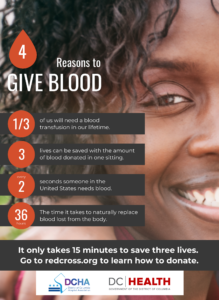

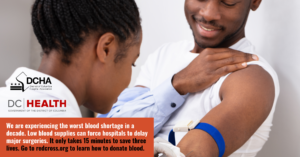
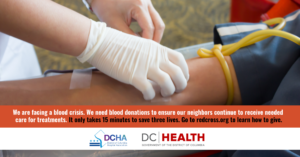
2022 年 2 月 16 日,联合委员会在医护人员中分享了 COVID 疫苗接种所需的文件。联合委员会现在将要求医疗保健机构提供以下文件:
新要求
疫苗接种率计算
哥伦比亚特区医院协会 (DCHA) 和美国领先的移动患者转运平台 XFERALL 建立了合作伙伴关系,为 DC 医院提供了一种将急性和行为健康患者转移到临床上合适的医疗机构的新流程。
与该国一样,该地区正在经历大量行为健康患者,这导致对危机服务的需求增加。 DCHA 和 XFERRAL 都认识到与不同合作伙伴合作创建创新解决方案以支持行为健康访问的重要性。
XFERALL 减少了医疗和行为健康患者在医疗机构之间的转移时间。
这是 DCHA 为确保满足行为健康需求而开展的众多项目之一。 DCHA 致力于许多专注于为行为健康社区服务的举措。
DCHA 总裁兼首席执行官 Jacqueline D. Bowens 说:“与 XFERALL 合作开展这项重要工作为我们的成员提供了一个额外的工具,以继续我们为我们医院服务的所有个人提供安全、高质量的患者护理的承诺。”
XFERALL 在其他州的合作伙伴已经将等待转移到适当护理的时间减少了多达 86%。
“我们很高兴将我们的创新平台带到华盛顿特区的医院,以帮助减少基本医疗和行为健康护理的等待时间,”XFERALL 首席执行官 Nathan Read 说。 “太多处于危机中的患者等待治疗的时间太长。我们知道,当患者护理不被延迟并且在他们的社区中可以访问时,结果会更好。通过与 XFERALL 合作,DC 医院正在努力提供解决方案,以解决急诊科拥挤、临床医生倦怠和护理延误等严重挑战。”
DCHA 是哥伦比亚特区医院和卫生系统的统一声音,致力于推进卫生政策,以加强该地区的世界级卫生保健系统,以确保它对所有人公平和可及。
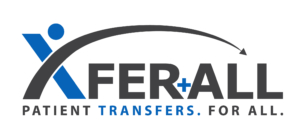
这 美国急诊医师学院 (ACEP) 去年 8 月将医院急诊科患者的登机时间确定为“历史最高水平”。这适用于所有等待转移到不同设施进行所需治疗的患者,无论是行为健康设施还是提供更高水平急性护理的医院。
ACEP 确定了增加登机时间的两个原因:1) 医院人员短缺和 2) 患有 COVID-19 和其他紧急情况的重症患者涌入,部分原因是患者在大流行期间延迟了必要的医疗护理。
对于需要行为健康治疗的患者,即使在 COVID-19 大流行之前,急诊医院急诊科的平均等待时间 保守地 估计是八小时。然而,有趣的是,全国各地的医院经常报告临床上合适的等待时间要长得多,可用的精神病床很难确定,特别是对于某些人群,如儿童和青少年、老年患者以及同时患有疾病的人。
今天,就在 ACEP 提出对历史最高登机时间的担忧仅仅五个月之后,这个问题变得更加严重,因为该国正在经历更多的 COVID-19 病例,这是由 Omicron 变体推动的,而且人员配备更加紧张短缺。
对于医院使用 XFERALL 为了自动化和加快急性医疗和行为健康患者转移,情况并不那么黯淡。仅在德克萨斯州,2020 年 8 月至 2021 年 7 月期间使用 XFERALL 转移医疗患者的医院在不到 1 分 18 秒内就收到了接收医院对其转移请求的响应,并在不到 20 分钟的时间内确保接受患者转移。在过去两年中,即使在大流行期间,XFERALL 的合作伙伴也将行为健康患者的转移时间减少了 86%。
XFERALL 使医疗保健系统和提供者能够快速确定有能力接受患者进行转移的医疗和行为医院。 XFERALL 技术使患者转移过程自动化,减少了医疗保健提供者的工作量,并通过减少转移时间提高了急诊科的能力。通过使患者转移过程自动化并提高对更广泛的潜在可用床位网络的可见性,XFERALL 消除了护士和其他临床医生拨打劳动密集型电话和传真的需要,以便为需要转移的患者确定临床上适当的护理。
国家的医疗人员配备危机没有简单的解决办法,COVID-19 的终结仍然难以捉摸。好消息是,尽管如此,医院仍可以通过实施内部后勤和运营来加速患者有效和高效地过渡到适当的治疗,从而减少护理延误并减轻人员短缺的后果。改进始于质疑拿起电话和传真临床信息的旧习惯,并对患者转移过程的现代化持开放态度。从来没有像现在这样紧迫。
要了解有关与 DC 地区医院和行为健康团队合作的更多信息,请联系政府事务和政策高级副总裁 Jennifer Witten,网址为 Jennifer.Witten@xferall.com.
哥伦比亚特区医院协会 (DCHA) 在 12 月 15 日的董事会年度会议上投票选出了新的董事会官员,任期从 2022 年 1 月开始。DCHA 是哥伦比亚特区医院和卫生系统的统一声音并努力推进卫生政策,以加强该区的世界级卫生保健系统,以确保它对所有人公平和可及。 DCHA 董事会为协会制定战略方向。 2022 年董事会官员是:
Hasan Zia 博士,董事会主席
西布利纪念医院总裁兼首席运营官
安妮塔詹金斯,副主席
霍华德大学医院首席执行官
克里斯托弗·金博士,秘书
乔治城大学医学中心副教授
Dania O'Connor,财务主管
华盛顿精神病学研究所首席执行官
约翰洛克伍德,前任主席
MedStar 国家康复医院总裁兼 MedStar Health 高级副总裁
Jacqueline D. Bowens,总裁兼首席执行官
哥伦比亚特区医院协会
除了新的董事会外,DCHA 还任命了一名一般会员成员,并欢迎 James Linhares 离开 BridgePoint Hospital Capitol Hill 后加入董事会:
Kathy Hollinger,一般会员董事会成员
华盛顿大都会饭店协会主席兼首席执行官
Ryan Zumalt,董事会董事,BridgePoint Hospital Capitol Hill 首席执行官
DCHA 总裁兼首席执行官 Jacqueline D. Bowens 说:“DCHA 很荣幸有这样一群受人尊敬的个人为协会、我们的医院和哥伦比亚特区的居民服务。”
Peer recovery and outreach coaches from five District hospitals gathered for an in-person meeting at Unity Health Care, a community health center, on September 9. The group met to discuss strategies for eliminating barriers and increasing community support for patients entering substance use treatment programs. For the peers, having a strong relationship with community partners is a key component of the referral process, and often determines whether a patient is linked to treatment.
“I loved putting a face to the name of providers we talk to every week,” said Veronica Williams, a hospital-based peer recovery coach from 联合医疗中心. “The in-person meeting was great because we got to experience the facility first-hand and got to interact with the people who we are sending our patients to, to help them know what to expect when they arrive.”
Community-based coaches also reiterate the importance of community collaboration in supporting patients in finding long-term recovery. “It was an amazing experience to meet the people at Unity, see their facility and discuss our roles in health care together. It really adds to the sense of community we are trying to establish as peers when we can get together to have a discussion on how to best serve our patient population and community at large!” said Thaddeus Wientzen, an outreach coach from MedStar 乔治敦大学医院.
A patient’s experience at a treatment center has a strong impact on their overall recovery and a negative experience can deter a patient from wanting to enter treatment again. Part of the role of the hospital-based peers is to motivate patients to enter treatment and that includes finding the right treatment provider for each individual. Face-to-face meetings and facility tours help the coaches determine the right place for each patient.
“Visiting Unity Health Care’s East of the River location was very insightful. I personally did not know all the different aspects of the center and learned that there were walk-in hours for MAT patients. I have always had an excellent experience whenever I have used Unity’s services for referrals,” said William Ellis, an outreach coach from 霍华德大学医院.
Providing accessible community support is something Unity Health Care does every day by providing a full range of health and human services to meet community needs throughout the District. Nine Unity Health Care sites are fast-track providers for hospital referrals, working with peers to provide same-day or next-day appointments for substance use patients.
Unity Health Care’s Behavioral Health Program Manager Mary Wozniak shared that “meeting with the hospital peers was valuable to understand their perspectives and to reiterate the need for improved access to care with no barriers. When a patient is ready to access treatment, it’s best to connect them immediately, or you risk them returning to drug use. We hope that our open access model will help address some of that need.”
Note: All participants received a COVID-19 screening upon entry and followed CDC guidance on vaccination, mask wearing and social distancing.
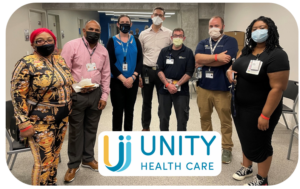
L-R: Corrine Simons, William Ellis, Mary Wozniak, Dr. Andrew Robie, Ean Bond, Thaddeus Wientzen, Veronica Williams
#Treatment
#Substance Use Disorder
#DCHA
#Collaboration
#Community
#医院
#Sustainability
On Tuesday, June 20th, the District of Columbia Hospital Association held its inaugural Patient Safety Summit, Back to Basics: Creating a Community Culture of Safety at the Milken Institute School of Public Health on the campus of The George Washington University. The event was an overwhelming success. With over 150 registrants and a robust and content rich agenda, attendees were provided the opportunity to collaborate, share best practices, and network, highlighting their continued commitment to providing safe and high quality patient care here in the District.
Auditorium
“The DCHA’s inaugural Patient Safety Summit was a spectacular success and I was extremely pleased to see so many healthcare leaders joining forces to focus on patient safety and learn from one another how best to do address this critical issue. This meeting laid the foundation for continued collaboration amongst the hospitals to improve healthcare in our great city. For me, one of the highlights of the summit was identifying and agreeing on the need for – and commitment to – data transparency. This transparency will mobilize us and help us reach our goal of making the District’s hospitals among the safest in the nation. As I look to the future, I eagerly welcome our new collaboration with the D.C. Health Department, we all share the same vision for the citizens of the District and are now on the road to turning that vision into reality.” Chip Davis, PhD, President & CEO, Sibley Memorial Hospital – Johns Hopkins Medicine; Chair, DCHA Board of Directors
During the program, DCHA presented Kathleen Chavanu Gorman, MSN, RN, FAAN, the Chief Operating Officer at Children’s National Health System, with the 2017 American Hospital Association Grassroots Advocacy Award for her dedication and commitment to the mission of hospitals on both the local and the national level.
Kathy Gorman Award Picture
Throughout the day, participants heard from national leaders, local officials, and hospital experts – including the majority of the District of Columbia hospital’s CEOs, who participated in a session entitled, “CEOs: Paving the Way for a Patient Safety Culture.” The session featured two panels that focused on the topics of Leadership and Collaboration.
Leadership Panel CEO Panel on Collaboration from left: Mark Chastang, CEO, Saint Elizabeths Hospital; Jim Linhares, CEO, BridgePoint Hospital Capitol Hill; Darcy Burthay, MSN, RN, President & CEO, Providence Health System – Ascension Health; Kurt Newman, MD, President & CEO, Children’s National Health System; Jim Diegel, CEO, Howard University Hospital
Leadership Panel CEO Panel on Leadership from left: John Rockwood, President, MedStar National Rehabilitation Hospital; Kimberly Russo, CEO, The George Washington University Hospital; Richard “Chip” David, PhD, Sibley Memorial Hospital – Johns Hopkins Medicine
“I was honored to serve on the CEO Leadership panel at DCHA’s first Patient Safety Summit which provided a valuable opportunity for healthcare leaders to collaborate on best practices in quality and safety,” said Kimberly Russo, Chief Executive Officer at The George Washington University Hospital. “Individuals across the DC region should have access to high-quality, safe healthcare no matter where they choose to receive it. By increasing transparency across organizations, we are able to work together to not only promote safety but ensure consistent, excellent medical care in the District of Columbia.”
A special thanks to those who presented at the Patient Safety Summit, including Dr. David Henderson of the National Institutes of Health Clinical Center who presented on “The Changing Landscape of Patient Safety,” Charisse Coulombe, MS, MBA, CPHQ of the Health Research and Educational Trust (HRET) at the American Hospital Association who spoke on “The Path Forward for Patient Safety,” and Dr. LaQuandra Nesbitt, MPH, the Director of the D.C. Department of Health, who spoke about, “The Intersection of Health Equity & Patient Safety and Quality.”
J. Bowens DCHA Patient Safety Summit
“While this event is just a first step in our collective quality journey, it was an impactful one. DCHA looks forward to continuing our work with our hospitals and their teams as we further our commitment to putting safe, high quality patient care first in the District of Columbia.” – Jacqueline D. Bowens, President & CEO, District of Columbia Hospital Association
The association already has plans underway for the next Patient Safety Summit, which they hope will take place in the early winter of 2018.
This live event was designated by The George Washington University School of Medicine and Health Sciences for a maximum of 5 AMA PRA Category 1 credits. Those who attended the event have received an e-mail from GWU with information on how to claim those credits.
DCHA would like to again express our gratitude for our Summit sponsors. With almost unanimous sponsorship support from our member hospitals, their contributions and support provided the means for such a successful event.
Patient Safety Summit Sponsors:
Children’s National
乔治华盛顿大学医院

MedStar 健康
Providence Hospital
西布利纪念医院
#Headlines
#Patient
#Safety
#Sibley
#Providence
#Summit
#Medstar
#Howard
#Childrens
Chronic diseases are a serious problem for District of Columbia residents and health care providers. With residents’ rates of obesity and diabetes at a critical high (Obesity: Adults 22%, High School Students 15%, Diabetes: 8.5%, At-Risk for Diabetes 6.55%), the linkage between sugar consumption and chronic disease can no longer be ignored. Reduction and elimination of sugary beverages, as well as public education on healthier dietary options, is an imperative to moving the needle on a healthier community.
To that end, DCHA has been working with the DC Department of Health (DOH) on an initiative to reduce the availability of sugary beverages, and promote healthier options within the District’s hospitals. Through the program, DCHA will be asking the District’s hospitals to commit to:
Sibley Memorial Hospital, part of Johns Hopkins Medicine, was the first hospital in the District to create and implement a reduction and elimination program, but several others are not far behind. For those interested and able, DCHA plans to assist our members on implementation of sugary beverage reduction programs at their facility. In doing our part, the Association has also eliminated the availability of sugary-beverages to staff and meeting attendees in our office.
DCHA will be updating our website to include information on the sugary beverage healthier hospitals initiative, including tools and resources for your facility.
You can follow DCHA’s Kick the Can campaign by searching #RethinkYourDrink on twitter.
#Headlines
#DCHA
#Announcement
#Sugar
#Beverage
#DOH
#RethinkYourDrink
#Healthy
Washington, DC – July 25, 2018 – Today, the District of Columbia Hospital Association (DCHA) released a statement on Providence Health System’s announcement regarding their pending service changes.
“Hospitals and health systems across the country have been adapting to the future delivery of health care and the District’s hospitals have not been immune from these changes,” said Jacqueline D. Bowens, President & CEO of the District of Columbia Hospital Association. “As the industry shifts toward a population health focus, health systems continue to identify ways to strengthen collaborations between acute care and community-based services, to meet people where they are and ultimately improve health outcomes”.
The Association is pleased that Providence, while making a transition out of acute care, remains fully dedicated to the residents of the District of Columbia. This new community-focused model represents a unique opportunity for Providence and the District’s community of hospitals to work in concert to transform health delivery —- keeping the patient at the center of everything we do.
DCHA will be working with all our members, including Providence, to engage key stakeholders both inside and outside the hospital industry to ensure that District residents continue to have access to high-quality health services ranging from acute care to primary care.
###